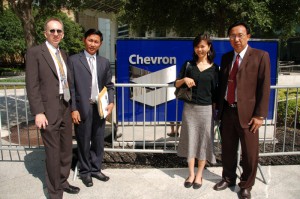Ripe time for shareholder advocacy
Spring is the season of Annual General Meetings (AGMs) – a rare moment when corporate executives have to account to their shareholders. For the growing “socially responsible investment” (SRI) movement and a handful of NGOs and other advocates, AGMs provide a chance to raise critical issues and rally shareholder support for corporate change. Chevron’s AGMs […]
Spring is the season of Annual General Meetings (AGMs) – a rare moment when corporate executives have to account to their shareholders. For the growing “socially responsible investment” (SRI) movement and a handful of NGOs and other advocates, AGMs provide a chance to raise critical issues and rally shareholder support for corporate change. Chevron’s AGMs have often been contentious, but this year’s meeting – happening today – should be particularly interesting.
Shareholder advocacy can be a useful tool in campaigns and Oxfam has long worked with the SRI community to put pressure on targeted companies. Among its shareholder advocacy efforts, Oxfam worked with the Coalition of Immokalee Workers to pressure Yum! Brands around farmworker compensation; worked with shareholders and Fair Trade coffee advocates to pressure Kraft at its 2003 AGM, worked with partner groups from Ghana, Peru, and Nevada around Newmont Mining Company’s 2005 AGM; and raised Ethiopia trademark rights at Starbucks’ 2007 AGM.
In 2008, Oxfam America established a Fund specifically aimed at purchasing shares in targeted companies. “As a shareholder, we have added rights and legitimacy to engage with corporate leadership; it has greatly expanded and strengthened our corporate advocacy work,” says Michelle Katz Talukdar, who oversees the Fund at Oxfam America. Among the 25 companies in its portfolio, Oxfam has attended RJ Reynolds AGMs in 2010 and 2011 to support the rights of tobacco farmworkers.

In spring 2010, Oxfam worked with a number of SRI and faith based funds to file its first formal shareholder resolution with Chevron, seeking greater transparency around payments to governments in countries where Chevron operates. The resolution was supported by shareholders representing more than $10 billion in investments. (Alongside this effort, Oxfam joined with the Publish What You Pay Campaign in a successful effort to establish a new SEC reporting requirement on all oil and mining companies. By law, Chevron and others will now have to disclose payments in every country of operation.)
One year later, advocates are again descending upon Chevron headquarters to draw shareholder and public attention to alleged company abuses from Nigeria to China, Khazakstan to Burma – all described in the alternative annual report “The True Cost of Chevron”. Among these groups, three inhabitants of the Ecuadorian Amazon will be on hand to push Chevron to respond to the recent court decision holding the company responsible for 20 years of rainforest destruction to the tune of $18 billion (as covered by my previous blog).
The Ecuadorian advocates come armed with a recent study arguing that the company has been concealing the true risks of this lawsuit to its shareholders. Chevron has down-played its liabilities and promised to fight the case in every possible venue (legal and otherwise – offering grist for a particularly amusing spoof on their We Agree campaign). But long-time shareholder advocates Simon Billenness (formerly with Oxfam America) and Sanford Lewis put the lie to Chevron claims with a thorough analysis of the economic risks presented by the Ecuadorian case. As the report notes, Chevron’s Deputy Comptroller Rex Mitchell told a US District Court that the Ecuadorian judgment could cause “irreparable injury to Chevron’s business reputation and business relationships”. On the basis of that analysis, Trillium Asset Management has submitted a formal letter asking the SEC to review potentially misleading statements from Chevron in its Annual Report concerning the real risks to shareholders arising from the Ecuadorian case.
Corporate advocacy is an uphill battle –and the handful of civil society advocates are little match for the estimated 80,000 multi-national corporations around the world. Greater corporate disclosure and transparency are vital to evening the odds and empowering broader constituencies – shareholders, communities, local governments, consumers, the public at large – to hold companies accountable. To that end, much of Oxfam’s work – revenue transparency, community rights to information, “poverty foot-printing”, human rights impact assessments, shareholder advocacy, etc – is devoted to enhanced transparency as a matter of corporate leadership and legal requirement.